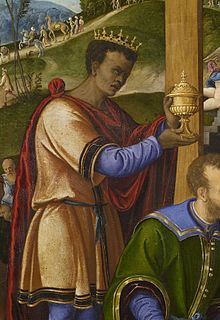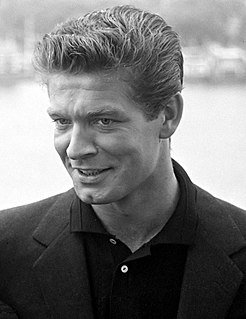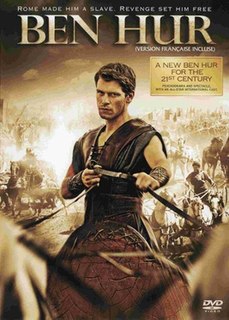| Messala | |
|---|---|
| Ben Hur character | |
| First appearance | A Tale of the Christ (1880, novel) |
| Last appearance | Ben Hur (2016, film) |
| Created by | Lew Wallace |
| Portrayed by | |
| Voiced by | Duncan Fraser (2003) |
| Information | |
| Gender | Male |
| Occupation | Roman nobleman Roman military general Charioteer |
Messala is a fictional character from Lew Wallace's 1880 novel Ben-Hur: A Tale of the Christ , and its film adaptations, where he appears as the main antagonist.
A character is a person or other being in a narrative. The character may be entirely fictional or based on a real-life person, in which case the distinction of a "fictional" versus "real" character may be made. Derived from the ancient Greek word χαρακτήρ, the English word dates from the Restoration, although it became widely used after its appearance in Tom Jones in 1749. From this, the sense of "a part played by an actor" developed. Character, particularly when enacted by an actor in the theatre or cinema, involves "the illusion of being a human person". In literature, characters guide readers through their stories, helping them to understand plots and ponder themes. Since the end of the 18th century, the phrase "in character" has been used to describe an effective impersonation by an actor. Since the 19th century, the art of creating characters, as practiced by actors or writers, has been called characterisation.

Lewis Wallace was an American lawyer, Union general in the American Civil War, governor of the New Mexico Territory, politician, diplomat, and author from Indiana. Among his novels and biographies, Wallace is best known for his historical adventure story, Ben-Hur: A Tale of the Christ (1880), a bestselling novel that has been called "the most influential Christian book of the nineteenth century."

Ben-Hur: A Tale of the Christ is a novel by Lew Wallace published by Harper and Brothers on November 12, 1880, and considered "the most influential Christian book of the nineteenth century". It became a best-selling American novel, surpassing Harriet Beecher Stowe's Uncle Tom's Cabin (1852) in sales. The book also inspired other novels with biblical settings and was adapted for the stage and motion picture productions. Ben-Hur remained at the top of the US all-time bestseller list until the publication of Margaret Mitchell's Gone with the Wind (1936). The 1959 MGM film adaptation of Ben-Hur is considered one of the greatest films ever made and was seen by tens of millions, going on to win a record 11 Academy Awards in 1960, after which the book's sales increased and it surpassed Gone with the Wind. It was blessed by Pope Leo XIII, the first novel ever to receive such praise. The success of the novel and its stage and film adaptations also helped it to become a popular cultural icon that was used to promote numerous commercial products.













